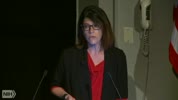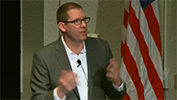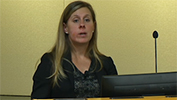-
- NIH VideoCast - A Personal Perspective on Race, Opportunity and the U.S. Health System
-
- - Louis W. Sullivan, MD, U.S. Secretary of Health and Human Services, 1989??993 (2016/11/24)
- - Category : History of Medicine
- In this presentation, Dr. Sullivan relates his life story, growing up in rural Georgia during the period of legally-sanctioned and enforced racial segregation and the impact it had on him, his family, and on the black community.
He was inspired to become a physician when, at age 5, he met the only black physician in Southwest Georgia.
After becoming a hematologist and professor of medicine at Boston University School of Medicine, he went on to found the Morehouse School of Medicine in Atlanta, followed by an appointment as U.S. Secretary of Health and Human Services in the administration of George H.W. Bush.
Dr. Sullivan developed a number of initiatives to increase racial, ethnic and gender diversity in the U.S. Department of Health and Human Services and in the nation?? health workforce.
Throughout his career, Sullivan has worked to improve the effectiveness of the U.S. health system, and the diversity of its workforce. The elimination of disparities in health care, which exists between whites and the nation?? underserved minorities is an on-going priority of Dr. Sullivan. Progress to-date and remaining challenges will be discussed.
For more information go to https://www.nlm.nih.gov/hmd/happening/lectures/lectures_2016.html
NIH VideoCast - A Personal Perspective on Race, Opportunity and the U.S. Health System
-
- NIH VideoCast - Redox Biology 2016: Signal transduction, Angiogenesis
-
- - Terry Moody, Ph.D., NCI, NIH and David Roberts, Ph.D., NCI, NIH (2016/11/24)
- - Category : Redox Biology
- Signal transduction, Angiogenesis
For more information go to http://ccr.cancer.gov/trainee-resources-courses-workshops-rb
NIH VideoCast - Redox Biology 2016: Signal transduction, Angiogenesis
-
- NIH VideoCast - Ethical and Regulatory Aspects of Clinical Research Session 2: IRBs, Fair subject selection, and the voices of participants
-
- - Sara Hull, Dave Wendler (2016/11/24)
- - Category : Bioethics
- The Department of Bioethics offers this seven to eight week course annually each fall. The course is designed to provide an overview of the important issues in the ethics of human subject research for clinical investigators and others who participate in the conduct of research and is open to the entire NIH community as well as to those from outside NIH. Topics include the history of human subject research ethics, principles and guidelines, study design, subject recruitment, informed consent, and international research. The course is open to the entire NIH community as well as to those from outside NIH. The recommended textbook is Ethical and Regulatory Aspects of Clinical Research, edited by Emanuel et al (Johns Hopkins University Press). The course is taught by guest faculty and faculty members from the National Institutes of Health. This is a required academic program for Bioethics fellows.
NIH VideoCast - Ethical and Regulatory Aspects of Clinical Research Session 2: IRBs, Fair subject selection, and the voices of participants
-
- NIH VideoCast - Ethics Rounds: Who Should Be Able to Enroll in Phase 1 Trials?
-
- - George D. Demetri, MD, Professor of Medicine, Harvard Medical School and Director, Center for Sarcoma and Bone Oncology, Dana-Farber Cancer Institute and Case Presenter: Clark Hanmer, MD, NIH Research Participant (2016/11/24)
- - Category : Clinical Center Grand Rounds
- Ethics Rounds: Who Should Be Able to Enroll in Phase 1 Trials?
For more information go to http://www.cc.nih.gov/about/news/grcurrent.html
NIH VideoCast - Ethics Rounds: Who Should Be Able to Enroll in Phase 1 Trials?
-
- NIH VideoCast - Democratizing discovery science with n=Me
-
- - Elizabeth Ofili, M.D., M.P.H., F.A.C.C., Professor of Medicine (Cardiology) and Senior Associate Dean of Clinical and Translational Research at Morehouse School of Medicine (2016/11/24)
- - Category : WALS - Wednesday Afternoon Lectures
- NIH Wednesday Afternoon Lecture
The NIH Precision Medicine Initiative intends to build bridges from genome medicine to data science by reaching over 1 million Americans. Yet it is far from certain that under-represented populations will actively engage PMI and other NIH discovery science opportunities. We have known for some time that a lack of inclusion of under-represented populations in biomedical research contributes to inequities in health. Thus, any persistent lack of participation in regards to the bold promises of PMI could exacerbate health disparities as we enter the new age of genome science and digital technology.
Dr. Ofili will present new data on how and why traditionally under-represented patients and minority research participants may or may not choose to actively participate in scientific discovery. Her technology innovation is at the intersection of patient engagement, health systems, and the community, three stakeholder pillars that are relevant to precision medicine and discovery science. Moreover, her research underscores the opportunity to effectively engage an increasingly diverse and mobile America in a new biomedical research landscape beyond the walls of the academic health system, to the communities where participants live, work, worship, and play.
For more information go to https://oir.nih.gov/wals/2016-2017/democratizing-discovery-science-nme
NIH VideoCast - Democratizing discovery science with n=Me
-
- NIH VideoCast - Going rogue: Aire and the enforcement of immune tolerance
-
- - Dr. Peter Savage (2016/11/24)
- - Category : Immunology
- Immunology Interest Group Seminar Series
The promiscuous expression of tissue-restricted antigens in the thymus, driven in part by Autoimmune Regulator (Aire), is critical for the protection of peripheral tissues from autoimmune attack. Aire-dependent processes are thought to promote both clonal deletion and the development of Foxp3+ regulatory T (Treg) cells, suggesting that autoimmunity associated with Aire deficiency results from two failed tolerance mechanisms. Here, examination of autoimmune lesions in Aire-/- mice revealed an unexpected third possibility. We found that the predominant conventional T cell clonotypes infiltrating target lesions express antigen receptors that were preferentially expressed by Foxp3+ Treg cells in Aire+/+ mice. Thus, Aire enforces immune tolerance by ensuring that distinct autoreactive T cell specificities are directed into the Treg cell lineage; dysregulation of this process results in the diversion of Treg cell-biased clonotypes into pathogenic conventional T cells.
NIH VideoCast - Going rogue: Aire and the enforcement of immune tolerance
-
- NIH VideoCast - Redox Biology 2016: Redox biology, Epidemiology
-
- - David Wink Ph.D., NCI, NIH and Stefan Ambs, Ph.D., M.P.H, NCI, NIH (2016/11/24)
- - Category : Redox Biology
- Redox biology, Epidemiology
For more information go to http://ccr.cancer.gov/trainee-resources-courses-workshops-rb
NIH VideoCast - Redox Biology 2016: Redox biology, Epidemiology
-
- NIH VideoCast - TRACO 2016: Radiation oncology and Small molecules
-
- - E. Nichols, MD., University of Maryland and Anton Simeonov, Ph.D.,NIH (2016/11/24)
- - Category : TRACO
- Radiation oncology and Small molecules
For more information go to http://ccr.cancer.gov/trainee-resources-courses-workshops-traco
NIH VideoCast - TRACO 2016: Radiation oncology and Small molecules
-
- NIH VideoCast - NIH Pediatric Concussion Workshop (Day 1)
-
- - NINDS, NIDA and NICHD (2016/11/24)
- - Category : Conferences
- Millions of children suffer concussions each year. This workshop will bring together experts in the field of pediatric concussion who will present their most recent findings and participate in break-out group discussions. The goals of this workshop are to: (1) identify gaps in our knowledge about pediatric concussion, (2) identify high priority areas of research in pediatric concussion, and (3) identify populations and study designs that will prove most feasible for addressing knowledge gaps.
NIH VideoCast - NIH Pediatric Concussion Workshop (Day 1)
-
- NIH VideoCast - NIH Pediatric Concussion Workshop (Day 2)
-
- - NINDS, NIDA and NICHD (2016/11/24)
- - Category : Conferences
- Millions of children suffer concussions each year. This workshop will bring together experts in the field of pediatric concussion who will present their most recent findings and participate in break-out group discussions. The goals of this workshop are to: (1) identify gaps in our knowledge about pediatric concussion, (2) identify high priority areas of research in pediatric concussion, and (3) identify populations and study designs that will prove most feasible for addressing knowledge gaps.
NIH VideoCast - NIH Pediatric Concussion Workshop (Day 2)
-
- NIH VideoCast - Cytokine Signaling: Genes, Genomes and Drugs
-
- - John J. O`Shea, M.D., Scientific Director and Senior Investigator, National Institute of Arthritis and Musculoskeletal and Skin Diseases, NIH (2016/11/24)
- - Category : Philip S. Chen - Innovation & Technology Transfer
- Eleventh annual Philip S. Chen, Jr., Ph.D. Distinguished Lecture on Innovation and Technology Transfer
John J. O`Shea graduated Phi Beta Kappa from St. Lawrence University with a Bachelor of Science degree, and then gained a Doctor of Medicine degree from the University of Cincinnati. He carried out a residency in Internal Medicine at the State University of New York Upstate Medical University and did subspecialty training at the National Institute of Allergy and Infectious Diseases, NIH. Dr. O??hea has made fundamental discoveries related to the basic mechanisms underlying cytokine signal transduction, molecules that are critical for the development and functioning of the immune system. He and his colleagues first cloned the human tyrosine kinase JAK3 and discovered its role in signaling by interleukin-2. These insights led to the discovery of JAK3 mutations as a cause of severe combined immunodeficiency. The demonstration of the role of Janus kinases in cytokine signaling led Dr. O??hea and his colleagues to propose that targeting JAKs would represent a new class of immunomodulatory drugs. He was awarded a U.S. patent for his work on Janus family kinase inhibitors and developed a Cooperative Research and Development Agreement with the pharmaceutical company Pfizer, which generated one such compound. This drug, tofacitinib, is now approved for the treatment of rheumatoid arthritis and is the first oral therapy for rheumatoid arthritis approved in a decade.
Dr. O`Shea has received numerous awards, including: the NIH Director`s Award four times, the US Public Health Service Physician Researcher of the Year Award, the Irish Immunology Public Lecture Award, the Arthritis Foundation`s Howley Prize, the Ross Prize in Molecular Medicine, the Daniel Drake Prize, as well as Danny Thomas, Lockey, Cochrane, Talmadge and Stone lectureships. He was nominated to give a lecture at the Nobel Forum and was a Distinguished Lecturer at this year?? American Association of Immunology annual meeting. He was designated as one the ??he World?? Most Influential Scientific Minds 2003-2014??by Thompson Reuters. Dr. O??hea is a member of the American Association of Physicians, a Fellow of the American Association for the Advancement of Science (AAAS) and a member of the National Academy of Medicine. He has published more than 300 peer-reviewed articles and has been on the editorial boards of many journals including the Journal of Biological Chemistry, Blood, Journal of Immunology, Immunity and the Journal of Experimental Medicine. Dr. O??hea is a founding Director of the NIH/Oxford Graduate Program in Biomedical Science and a Professor of Pathology at the University of Pennsylvania.
NIH VideoCast - Cytokine Signaling: Genes, Genomes and Drugs
-
- NIH VideoCast - Opioids for Chronic Pain: Evidence, Guidelines, and Policy and Practice Implications
-
- - Roger Chou, M.D., Department of Medicine and Department of Medical Informatics and Clinical Epidemiology, Oregon Health & Science University (2016/11/24)
- - Category : National Center for Complementary and Integrative Health
- NCCIH Integrative Medicine Research Lecture
The presentation reviews epidemiological data on opioid prescribing, evidence on benefits and harms of opioid therapies, and recently released guidelines from the Centers for Disease Control and Prevention (CDC) on use of opioids for chronic pain. Dr. Chou is the lead author on a systematic review of opioids for chronic pain conducted for an NIH Pathways to Prevention workshop and an author of the CDC guidelines.
For more information go to https://nccih.nih.gov/news/events/IMlectures
NIH VideoCast - Opioids for Chronic Pain: Evidence, Guidelines, and Policy and Practice Implications
-
- NIH VideoCast - Maurice B. Burg Lecture 2016: The Kidney and New Therapies for Diabetes
-
- - Ernest M. Wright, DSc, FRS, University of California, Los Angeles (2016/11/24)
- - Category : Special
- In the early 20th century Homer Smith demonstrated that glucose was freely filtered by the human kidney, no glucose was lost in the urine, and phlorizin completely blocked glucose reabsorption. Despite the fact that glycosuria is a hallmark of diabetes, a new class of drugs derived from phlorizin have been introduced to lower hyperglycemia in these patients by increasing glycosuria. Dr. Wright will review the kidney physiology and preclinical studies that led to this unexpected new treatment for diabetes.
NIH VideoCast - Maurice B. Burg Lecture 2016: The Kidney and New Therapies for Diabetes
-
- NIH VideoCast - TRACO 2016: Epidemiology and SCLC
-
- - Neil Caporaso, MD, NCI, NIH and Haobin Chen, MD, PhD, NCI, NIH (2016/11/24)
- - Category : TRACO
- Epidemiology and SCLC
For more information go to http://ccr.cancer.gov/trainee-resources-courses-workshops-traco
NIH VideoCast - TRACO 2016: Epidemiology and SCLC
-
- NIH VideoCast - Getting to the end by any means necessary: Lessons learned from proteomics of human telomeres
-
- - Dr Roddy O`Sullivan, University of Pittsburgh (2016/11/24)
- - Category : DNA Repair
- DNA Repair Interest Group videoconference
Acrobat Slides
NIH VideoCast - Getting to the end by any means necessary: Lessons learned from proteomics of human telomeres
-
- NIH VideoCast - Redox Biology 2016: Inflammation, NADPH oxidases
-
- - Hussain, P. and Leto, T. (2016/11/24)
- - Category : Redox Biology
- Inflammation, NADPH oxidases
For more information go to http://ccr.cancer.gov/trainee-resources-courses-workshops-rb
NIH VideoCast - Redox Biology 2016: Inflammation, NADPH oxidases
-
- NIH VideoCast - Ethical and Regulatory Aspects of Clinical Research Session 3: Risk and Benefits, Research with Children, and Research with Pregnant Women
-
- - Dave Wendler, Rober Nelson, Maggie Little (2016/11/24)
- - Category : Bioethics
- The Department of Bioethics offers this seven to eight week course annually each fall. The course is designed to provide an overview of the important issues in the ethics of human subject research for clinical investigators and others who participate in the conduct of research and is open to the entire NIH community as well as to those from outside NIH. Topics include the history of human subject research ethics, principles and guidelines, study design, subject recruitment, informed consent, and international research. The course is open to the entire NIH community as well as to those from outside NIH. The recommended textbook is Ethical and Regulatory Aspects of Clinical Research, edited by Emanuel et al (Johns Hopkins University Press). The course is taught by guest faculty and faculty members from the National Institutes of Health. This is a required academic program for Bioethics fellows.
NIH VideoCast - Ethical and Regulatory Aspects of Clinical Research Session 3: Risk and Benefits, Research with Children, and Research with Pregnant Women
-
- NIH VideoCast - Contemporary Clinical Medicine: Great Teachers: Leadership Development in a Neurosurgical Residency
-
- - Karin Muraszko, MD, Chair and Julian T. Hoff, Professor, Department of Neurosurgery, University of Michigan Health System, Ann Arbor (2016/11/24)
- - Category : Clinical Center Grand Rounds
- Contemporary Clinical Medicine: Great Teachers: Leadership Development in a Neurosurgical Residency
For more information go to http://www.cc.nih.gov/about/news/grcurrent.html
NIH VideoCast - Contemporary Clinical Medicine: Great Teachers: Leadership Development in a Neurosurgical Residency
-
- NIH VideoCast - Elements of health and disease: inorganic fluxes and metal receptors that control cell fate decisions
-
- - Thomas O`Halloran, Ph.D., Charles E. and Emma H. Morrison Professor, Department of Chemistry, Department of Molecular Biosciences and Founding Director, The Chemistry of Life Processes Institute, Northwestern University (2016/11/24)
- - Category : WALS - Wednesday Afternoon Lectures
- NIH Director`s Wednesday Afternoon Lecture
For the past three decades, Thomas V. O`Halloran has investigated how fluctuations in the amount of metal ions inside cells influence key cellular decisions. Using genetic, chemical, structural, and mechanistic approaches, he has uncovered new types of metal receptors and tied their function to a number of disease-related physiological processes. O`Halloran identified early examples of metal ion receptors called metalloregulatory proteins that regulate gene expression. He and his collaborators also discovered a second class of metal receptors called metallochaperone proteins that govern the flow of metals within the cell. The O`Halloran lab currently focuses on how intracellular fluxes of iron, copper, zinc, and other metals regulate pathways needed for cell growth and proliferation.
O`Halloran and his team have recently demonstrated essential roles for intracellular zinc fluctuations in mammalian oocyte maturation and fertilization. Using novel small-molecule probes as well as single-cell X-ray fluorescence microscopy, the research group established that the uptake of billions of zinc atoms regulates meiotic cell-cycle progression. In contrast, the researchers found that rapid zinc exocytosis events, triggered by fertilization and collectively known as "zinc sparks," must occur before embryonic development can proceed. These findings may one day be useful in improving in vitro fertilization methods.
Changes in metal ion concentrations also control fundamental developmental decisions in bacteria and disease-causing parasites, as reported by O`Halloran and his colleagues. For example, the invasion of pathogens that cause fungal brain disease and malaria depends on spikes in copper and zinc, respectively.
These insights into the inorganic chemistry of the cell have led O`Halloran`s team to develop new therapeutic agents that selectively target metalloenzymes or harness the biological chemistry of nonessential metals such as molybdenum, arsenic, and platinum. .
For more information go to https://oir.nih.gov/wals/2016-2017
NIH VideoCast - Elements of health and disease: inorganic fluxes and metal receptors that control cell fate decisions
-
- NIH VideoCast - The Essential Role for Neutrophils in Blinding Fungal Infections of the Cornea
-
- - Dr. Eric Pearlman, Chancellor`s Professor of Ophthalmology, Physiology and Biophysics, Director of the Institute of Immunology, University of California, Irvine (2016/11/24)
- - Category : Immunology
- Immunology Interest Group Seminar Series
Conventional wisdom views neutrophils as a homogeneous population of short-lived, terminally differentiated cells; however, several studies indicate that neutrophils survive longer in peripheral blood and also in inflammatory conditions as a result of anti-apoptotic signals. Further, there is compelling evidence that neutrophils are not terminally differentiated, as multiple stimuli induce gene expression and production of chemotactic and immunoregulatory cytokines that regulate inflammatory, infectious and neoplastic diseases. Our studies primarily use murine models of blinding fungal and bacterial infections of the cornea, where we found that neutrophils undergo profound transcriptional changes compared with bone marrow neutrophils. The effect of two of these neutrophil genes, IL-1棺 and IL-17A, will be discussed.
Dr. Eric Pearlman is a Chancellor`s Professor of Ophthalmology, and of Physiology and Biophysics, and the Director of the Institute of Immunology at the University of California, Irvine. Eric received his Ph.D. in Microbiology from the University of Texas in San Antonio. He did his postdoc at Case Western Reserve University, where he stayed as faculty and obtained Tenure before relocating to the University of California, Irvine. Throughout his career, Eric has contributed significantly to our understanding of the cellular and molecular mechanisms that modulate innate host defense during blinding ocular infections caused by parasites, bacteria and fungi. His lab`s recent work has identified and characterized a novel population of neutrophils that produce IL-17A and express a functional IL-17 receptor, leading to neutrophil autocrine activation and enhanced fungal ocular clearance in vivo. In addition, his lab has recently provided important insight into the molecular mechanisms that regulate NLRP3 inflammasome-dependent IL-1棺 secretion in neutrophils. Eric has received several honors and awards and has served as Associate Editor at The Journal of Immunology.
NIH VideoCast - The Essential Role for Neutrophils in Blinding Fungal Infections of the Cornea






















